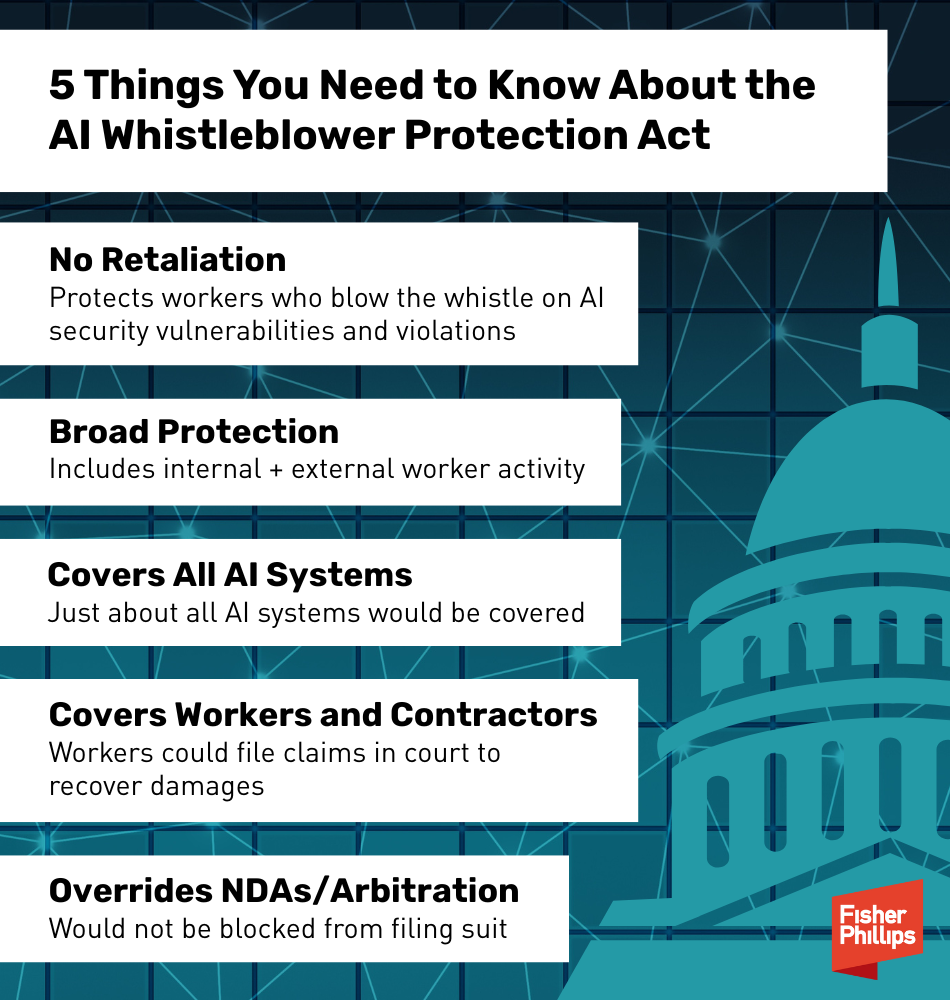A bipartisan bill pending before Congress would make it illegal to retaliate against employees who speak up about AI-related risks. Senators from both sides of the aisle introduced the AI Whistleblower Protection Act (S. 1792) last month, hoping to shield tech workers and others who expose AI security flaws, legal violations, or dangerous practices. House AI leaders quickly introduced a companion bill, intent on closing the growing gap in whistleblower protections related to artificial intelligence. More than 20 public interest organizations just called on Congress to pass the bill in a June 10 letter, citing retaliation, NDAs, and a chilling effect that could silence insiders. What do you need to know about this latest piece of potential AI that would impact the workplace?
|
💥 The prime sponsor of the House version of the bill, Rep. Jay Obernolte (R-CA), has just agreed to speak at FP’s AI Conference next month. Register now to hear first-hand about AI regulation and much more! |
5 Key Points About the AI Whistleblower Protection Act
There are five critical things you need to know about S. 1792 and HR 3460.
1. It Would Ban Whistleblower Discrimination
The bill would prohibit employment discrimination against those who blow the whistle on:
- AI security vulnerabilities: flaws that could enable theft or unauthorized acquisition of AI systems by anyone – including foreign actors.
- AI violations: breaches of federal law or failure to appropriately respond to a substantial and specific danger that an AI system may pose to public safety, health, or national security risks.
2. It Would Cast A Wide Net
Those reporting alleged misconduct to any of the following would be protected by this proposed law:
- External: Regulatory officials or law enforcement
- Internal: Supervisors or anyone reasonably believed to have authority to look into the misconduct
- Investigations: Testifying or assisting in any judicial or administrative investigation would also create protection
3. It Would Apply Broadly
The bill would apply to just about any AI system:
- Those that operate under varying, unpredictable conditions without heavy human oversight, or can learn from experience and improve performance over time.
- Those that solve tasks requiring human-like perception, cognition, planning, learning, communication, or physical action.
- Systems designed to think or act like a human, including cognitive architectures and neural networks.
- And more.
4. It Would Create Large-Scale Protections for Workers
Whistleblowers – including both employees and independent contractors – would be shielded from discharge, demotion, suspension, threats, or other adverse employment acts.
- Those who believe to be aggrieved could file a claim with the Department of Labor, and then could follow up by bringing a civil action seeking reinstatement, double back pay, damages, and attorneys’ fees.
- Bad-faith or intentionally false disclosures would not be protected.
5. It Would Override NDAs and Arbitration Agreements
The bill notes that certain common employment agreements and restrictive covenants would not block workers from pursuing remedies under the law.
- The bill indicates that no contract, agreement, policy form, or condition of employment would be able to interfere with workers’ rights under this law, including non-disclosure agreements (NDAs).
- Further, arbitration or any other alternative dispute resolution agreements would not prevent workers from seeking relief with the DOL or in civil court.
Why This Matters to Employers
- New Compliance Risk: Companies using or developing AI may face whistleblower complaints tied to allegedly biased algorithms, safeguards deemed insufficient, or other subjective concerns.
- Recordkeeping Obligations: Employers will need to beef up their protocols for preserving internal reports, Slack messages, emails – any material tied to AI concerns.
- Policy Overhaul Ahead: Internal reporting channels, NDA templates, and training programs may require legal updates to comply.
- Stakes Raised for HR Protocols: Some of the best defenses to whistleblower complaints include a robust and thorough HR process demonstrating that any adverse action applied to the worker in question was fair, consistent, and justified.
The Latest
On June 10, a group of public interest groups sent a letter to Senate leadership urging swift passage of the proposed law. They warned that insiders may remain silent about serious AI-related risks without strong legal safeguards. The letter emphasized that whistleblowers are often the first to flag dangerous conduct that may not yet be illegal, and that current environments of fear and retaliation are stifling crucial voices. “Ensuring transparency and accountability in this field is not only a matter of public interest – it is a national security imperative,” the groups wrote. They added: “Strong whistleblower protections are a cornerstone of responsible governance and essential to guiding AI development in a way that upholds our shared democratic values.”
What’s Next?
Both bills were introduced on May 15 and still remain in committee. In the Senate, it currently sits in the Health, Education, Labor, and Pensions (HELP) Committee, and in the House, the Education and Workforce Committee. The bipartisan nature of the bills gives them a greater chance of progressing than other controversial proposals, but Congress is occupied with budget negotiations and other priorities that could sidetrack this effort. We’ll track their progress and keep you posted – make sure you are subscribed to Fisher Phillips’ Insight System to get the latest news.
What Should Employers Do Now?
Whether the bill passes or not, smart companies will prepare. Here’s your action checklist:
✅ Update Whistleblower Policies
-
- Add AI-related risks to internal reporting mechanisms.
- Reaffirm non-retaliation commitments during ethics and compliance trainings.
✅ Train Managers
-
- Teach supervisors to handle reports of AI issues neutrally and to escalate them legally.
✅ Secure and Preserve Records
-
- Be ready to retain communications and internal notes if a whistleblower report emerges.
✅ Engage in Policy Advocacy
-
- Industry groups may want to weigh in on the bill’s scope, especially if it could cover all employers using AI tools, not just developers.
- Work with the FP Advocacy Team to make your voice heard.
✅ Develop an Effective AI Governance Program
-
- An AI governance program will help set your organization up for success.
- Check out AI Governance 101: The First 10 Steps Your Business Should Take for more detail.
|
Want to Learn More About AI? Join Fisher Phillips for our third-annual AI Conference for business professionals this July 23 to 25, in Washington, D.C. Learn more and register here. |
Conclusion
If you have any questions, contact your Fisher Phillips attorney, the authors of this Insight, or any attorney in our AI, Data, and Analytics Practice Group, or on our Government Relations team or Tech Industry Team. Make sure you are subscribed to Fisher Phillips’ Insight system to receive the latest developments straight to your inbox.





